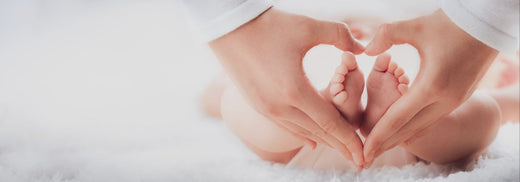De postpartumperiode is een bijzondere, maar ook uitdagende fase waarin je lichaam zich aanpast aan een totaal nieuwe situatie. Naast het fysieke herstel vinden er ingrijpende hormonale veranderingen plaats. De hormonen die tijdens de zwangerschap een hoofdrol speelden, zoals oestrogeen en progesteron, nemen ineens sterk af. Tegelijkertijd spelen andere hormonen, zoals prolactine en oxytocine, een grotere rol. Deze veranderingen hebben invloed op zowel je lichaam als je emoties.
Hormonale fluctuaties in de postpartumperiode
Oestrogeen en progesteron
Tijdens de zwangerschap waren oestrogeen en progesteron onmisbaar voor de groei van je baby. Deze hormonen bereikten hun hoogste niveaus ooit, maar na de bevalling dalen ze abrupt. Dit kan stemmingswisselingen veroorzaken, huilbuien en gevoelens van onzekerheid, ook wel bekend als de “baby blues.” Hoewel deze gevoelens meestal tijdelijk zijn, kunnen ze behoorlijk intens aanvoelen.
Prolactine
Prolactine is het hormoon dat de melkproductie op gang brengt en stimuleert. Tijdens de zwangerschap stijgt de hoeveelheid prolactine aanzienlijk, zodat je melkkliertjes en melkkanaaltjes in je borsten zich kunnen ontwikkelen. De hoge progesteronspiegel tijdens de zwangerschap onderdrukt de werking van prolactine echter nog, zodat de melkproductie pas echt op gang komt na de bevalling. Zodra het progesteron na de bevalling daalt, begint je lichaam moedermelk aan te maken.
Naast het stimuleren van melkproductie heeft prolactine nog een andere rol. Het zorgt voor een kalmerend effect en helpt je om je volledig op je baby te richten. Dit kan je helpen om te ontspannen, maar het kan ook bijdragen aan gevoelens van vermoeidheid. Bovendien kun je een overschot aan prolactine kwijtraken door te huilen. Die bekende kraamtranen zijn dus nuttig en helemaal niet vreemd!
Oxytocine
Oxytocine, ook wel het “knuffelhormoon” genoemd, speelt een cruciale rol bij de bevalling. Het zorgt voor de weeën en naweeën en helpt de baarmoeder na de bevalling weer in het normale formaat te komen. Maar oxytocine doet meer dan alleen dat: het versterkt de band tussen jou en je baby tijdens de postpartumperiode. Het wordt bijvoorbeeld vrijgegeven tijdens huid-op-huidcontact en het geven van borstvoeding. Dit hormoon geeft je vaak een warm en liefdevol gevoel, wat bijzonder waardevol kan zijn in de intensieve periode.
Hoe hormonen je emotionele en fysieke herstel beïnvloeden
De hormonale veranderingen in de postpartumperiode hebben niet alleen invloed op je emoties, maar ook op je lichaam. De afname van oestrogeen kan bijvoorbeeld zorgen voor een drogere huid, haaruitval en gevoelige gewrichten.
Emotioneel kunnen de fluctuaties leiden tot stemmingswisselingen, prikkelbaarheid en een gevoel van overweldiging. Dit is een normale reactie van je lichaam, maar het kan ook uitdagend zijn. Het is belangrijk om te onthouden dat dit een fase is en dat herstel tijd kost.
Hoe kun je jezelf ondersteunen tijdens deze periode?
Het herstellen na je bevalling is best een grote klus, dus gun jezelf de tijd en ruimte om goed voor jezelf te zorgen. Dit is echt het moment om wat meer me-time in te bouwen, ook al voelt dat misschien lastig met een kleintje om je heen. Denk daarnaast ook aan:
- Voedzaam eten. Probeer maaltijden te eten die je écht voeden. Denk aan avocado, noten, vette vis of lijnzaad voor die omega-3, samen met veel groenten, fruit, vezels en eiwitten. Dit soort voeding doet zoveel goeds voor je stemming en helpt je lichaam herstellen.
- Beweging. Nee, je hoeft echt niet meteen te sporten. Een rustige wandeling met de kinderwagen of wat eenvoudige postnatale yoga kan al een wereld van verschil maken. Het geeft je energie en je voelt je vaak net wat beter daarna.
- Slaap wanneer je kunt. Slapen met een pasgeborene in huis is een uitdaging. Maar echt, grijp die rustmomenten waar je kunt. Zelfs een kwartiertje liggen terwijl je baby slaapt, kan je helpen om je batterij een beetje op te laden.
- Vraag om hulp. Dit is misschien wel de belangrijkste. Je hoeft het echt niet allemaal alleen te doen. Vraag je partner, je moeder, een vriendin – wie dan ook – om wat taken van je over te nemen. Of het nu gaat om even oppassen, koken of gewoon een luisterend oor bieden. “It takes a village to raise a child” – een prachtige uitdrukking en zó waar.
Onthoud: dit is een fase en je doet het geweldig. Lief zijn voor jezelf is nu misschien wel het beste cadeau dat je jezelf (en je baby) kunt geven.
Tot slot
De postpartumperiode is een bijzondere tijd vol nieuwe ervaringen, uitdagingen en veranderingen. Het is niet alleen een tijd van herstel, maar ook een kans om opnieuw verbinding te maken met jezelf en je nieuwe rol als moeder. Je lichaam heeft zoveel werk verzet – het verdient liefde, aandacht en zorg. Neem het dag voor dag, en wees niet bang om hulp te vragen of even stil te staan bij wat je nodig hebt.
Wees trots op jezelf, ook op de dagen dat het zwaar voelt. Je hoeft het niet allemaal in één keer te weten of te doen. Geef jezelf de ruimte om te groeien, te leren en te herstellen. Je bent sterker dan je misschien denkt en je kan dit!








